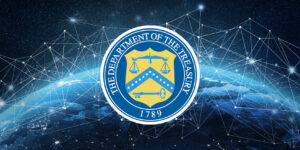
Weekly Update #35
MARK COLLINS & DEMETRIOS TSEAS
Regulatory:
CFTC Digital Assets and BlockchainA blockchain is a shared digital ledger, or a continually up... More Technology Subcommittee releases DeFi report: On Jan 8, the Digital Assets and Blockchain Technology Subcommittee of the CFTC’s Technology Advisory Committee, released a report on Decentralized Finance (DeFi). The report highlights that (DeFi) presents promising opportunities and complex, significant risks to the U.S. financial system, consumers, and national security. In the absence of effective regulation, enforcement, and compliance, many of these DeFi projects, enterprises, and ecosystems have been vulnerable to fraud, mismanagement, and serious regulatory violations, in addition to periods of extreme high market volatility, exposing investors, customers, and other stakeholders to significant losses. A central concern relating to DeFi systems is the lack of, and some industry designs to avoid, clear lines of responsibility and accountability. The central message of this report is that both government and industry should take timely action to work together, across regulatory and other strategic initiatives, to better understand DeFi and advance its responsible and compliant development.
The U.S. SEC approves the first 11 BitcoinThe term "Bitcoin" can either refer to Bitcoin the network, ... More ETFs: On Jan 10, the U.S. Securities and Exchange Commission (SEC) approved the first 11 Bitcoin Exchange-traded Funds (ETFs), introduced by the world’s largest asset managers. From a regulatory standpoint, this approval also highlights the evolving nature of cryptocurrencyA cryptocurrency (or crypto currency) is a digital asset des... More regulation. The list includes: ARK21 Shares Bitcoin ETF, Bitwise Bitcoin ETF, Blackrock’s iShares Bitcoin Trust, Franklin Bitcoin ETF, Fidelity Wise Origin Bitcoin Trust, Grayscale Bitcoin Trust, Hashdex Bitcoin ETF, Invesco Galaxy Bitcoin ETF, VanEck Bitcoin Trust, Valkyrie Bitcoin Fund, Wisdom Tree Bitcoin Fund. There are two types of ETFs: spot bitcoin ETFs that own bitcoin, actually held by a third-party custodian, and bitcoin futures ETFs that are backed by bitcoin derivatives that derive their value (speculate) from the future price of bitcoin. In both cases investors invest in Bitcoin without the need to purchase, hold or mange the underlying asset. One day later on Jan 11, U.S. Senator Elizabeth Warren criticized the SEC as being “ wrong on the law and wrong on the policy ” in approving ETFs, arguing that “ If the SEC is going to let crypto burrow even deeper in our financial system, then it’s more urgent than ever that crypto follow basic anti-money laundering rules”.
Genesis Global Trading settles with the NYDFS and will pay $8M: On Jan 12, the New York Department of Financial ServicesGeneral services, including non-profits, forums and news sit... More (NYDFS) announced a $8 million penalty against Genesis Global Trading Inc., for compliance failures after an investigation, that violated DFS’s virtual currency and cybersecurity regulations and left the company vulnerable to illicit activity and cybersecurity threats. In connection with this settlement, Genesis Global Trading will surrender its New York BitLicense.
Coinbase partners with stablecoinStablecoins maybe privately issued cryptocurrency or algorit... More exchange Yellow Card to expand in Africa: On Jan 11, Coinbase announced that they are expanding access to their products in Africa, starting with 20 countries across the continent. Coinbase’s new partnership with leading African stablecoin exchange Yellow Card will help millions of users gain access to USDC on Coinbase’s layer-2 blockchain called “Base”. Yellow Card proclaims itself as the largest and first licensed stablecoin on/off ramp in the African continent. Operating across 20 countries, Yellow Card provide access to USDT, USDC and PYUSD via their local currency directly and through their API. Coinbase walletA wallet is a device (a hardware device, a program, or servi... More users will be able to easily send USDC without fees on any platform where they can share a link, including WhatsApp, iMessage, Telegram, popular social media apps etc.
Crypto News:
Blackrock’s CEO backs Ether ETF: BlackRock CEO Larry Fink expressed support for the creation of an ETF, following the launch of the much-anticipated Bitcoin BTC ETF. Fink sees these ETFs as crucial steps toward tokenization, believing that this trend will addressIn a cryptocurrency context, an address is a cryptographic k... More issues like money laundering and corruption, and he views cryptocurrencies, particularly Bitcoin, as an asset class offering protection against geopolitical risks, comparing it to the historical role of gold. Yahoo
Vanguard restricts customers from purchasing BTC ETF products: Vanguard has prohibited clients from purchasing newly approved Bitcoin ETFs, such as BlackRock’s iShares Bitcoin Trust (IBIT) and Grayscale Bitcoin Trust (GBTC), citing reasons like regulatory restrictions and a focus on asset classes aligned with long-term investment portfolios. This move contrasts with the approach of competitors like VanEck, Fidelity, and Invesco, which have embraced Bitcoin ETFs. Marketwatch
Circle reportedly files for IPO: Circle, the issuer of USDC and the second-largest stablecoin, has reportedly filed for an IPO in the United States. While the filing did not disclose the number of shares to be sold or the proposed price range, Circle anticipates the IPO to proceed after the U.S. Securities and Exchange Commission completes its review, contingent on market conditions. Reuters
ETH devs split over Vitalik’s suggestion to increase gas fee limit: The Ethereum community remains divided on Vitalik Buterin’s proposal to increase the gas limit by 33%, aiming to enhance network throughput. While Buterin suggests the boost could accommodate more transactions per blockBlocks hold batches of valid transactions that are hashed an... More, concerns raised by developers such as Marius van der Wijden include potential drawbacks like accelerated growth in the blockchain state’s size, impacting storage access speed and synchronization times. MariusVanDerWijen Github
Hacks and Exploits:
Orbit Chain: A cross-chain bridging project, was the victim of a hack resulting in the loss of over $80 million in assets, with the attacker gaining access to seven out of ten multisigA “MultiSig” smart contract, or multi-signature wallet, ... More signers. The majority of the stolen funds were in stablecoins, including $30M in USDT, $10M USDC, and $10M DAI, 231 WBTC( $10M) and 9,500 ETH ($21.5M). concerns are raised about the security of multisig structures and potential compromises of private keys in the crypto space. Blockworks
- SEO Powered Content & PR Distribution. Get Amplified Today.
- PlatoData.Network Vertical Generative Ai. Empower Yourself. Access Here.
- PlatoAiStream. Web3 Intelligence. Knowledge Amplified. Access Here.
- PlatoESG. Carbon, CleanTech, Energy, Environment, Solar, Waste Management. Access Here.
- PlatoHealth. Biotech and Clinical Trials Intelligence. Access Here.
- Source: https://ciphertrace.com/weekly-update-35/
- :has
- :is
- :not
- :where
- $UP
- 1
- 10
- 11
- 12
- 15%
- 17
- 20
- 500
- 8
- 9
- a
- Able
- About
- accelerated
- access
- accommodate
- accountability
- across
- Action
- activity
- actually
- addition
- address
- advance
- advisory
- africa
- African
- After
- against
- Aiming
- aligned
- also
- an
- and
- anti-money laundering
- anticipates
- any
- api
- approach
- approval
- approved
- apps
- ARE
- AS
- asset
- asset class
- asset-managers
- Assets
- avoid
- backed
- backs
- basic
- BE
- been
- being
- believing
- Better
- Bitcoin
- Bitcoin BTC
- bitcoin derivatives
- Bitcoin ETF
- Bitcoin Futures
- Bitcoin Trust
- BitLicense
- Bitwise
- blockchain
- blockchain technology
- boost
- both
- bridging
- BTC
- BTC ETF
- Buterin
- by
- called
- CAN
- card
- cases
- central
- ceo
- CFTC
- Circle
- citing
- class
- classes
- clear
- clients
- coinbase
- Coinbase’s
- Collins
- COM
- commission
- committee
- community
- company
- comparing
- competitors
- Completes
- complex
- compliance
- compliant
- Concern
- Concerns
- conditions
- connection
- Consumers
- context
- continent
- continually
- contract
- contrasts
- Corruption
- could
- countries
- creation
- Cross-Chain
- crucial
- crypto
- crypto currency
- crypto space
- cryptocurrencies
- cryptocurrency
- cryptographic
- Currency
- custodian
- Customers
- Cybersecurity
- DAI
- day
- decentralized
- deeper
- DeFi
- defi projects
- Department
- Derivatives
- derive
- designs
- developers
- Development
- device
- Devs
- DID
- digital
- Digital Asset
- Digital Assets
- digital ledger
- directly
- Disclose
- divided
- drawbacks
- easily
- Ecosystems
- Effective
- either
- elizabeth
- embraced
- enforcement
- enhance
- enterprises
- etc
- ETF
- ETFs
- ETH
- Ether
- Ether (ETH)
- ethereum
- Even
- EVER
- evolving
- exchange
- Exchange Commission
- exchange-traded
- Expand
- expanding
- exploits
- expressed
- extreme
- failures
- fee
- Fees
- fidelity
- filed
- Files
- Filing
- financial
- financial system
- First
- Focus
- follow
- following
- For
- forums
- franklin
- fraud
- from
- fund
- funds
- future
- Future Price
- Futures
- Gain
- gaining
- Galaxy
- GAS
- GBTC
- Genesis
- Genesis Global
- Genesis Global Trading
- geopolitical
- GitHub
- Global
- going
- Gold
- Government
- Grayscale
- Grayscale Bitcoin Trust
- Grayscale Bitcoin Trust (GBTC)
- Growth
- hack
- Hardware
- hardware device
- HASHDEX
- hashed
- Have
- he
- Held
- help
- Hidden
- High
- highlights
- historical
- hold
- HTML
- HTTPS
- illicit
- illicit activity
- impacting
- in
- Inc.
- include
- includes
- Including
- Increase
- industry
- initiatives
- introduced
- Invesco
- Invest
- investigation
- investment
- Investors
- IPO
- iShares
- Issued
- Issuer
- issues
- IT
- ITS
- itself
- Jan
- keys
- Lack
- largest
- Larry Fink
- later
- launch
- Laundering
- Law
- leading
- Ledger
- left
- let
- Licensed
- like
- LIMIT
- lines
- LINK
- List
- local
- long-term
- loss
- losses
- Majority
- Managers
- many
- Market
- market conditions
- market volatility
- MARKETWATCH
- max-width
- maybe
- Media
- message
- million
- millions
- money
- Money Laundering
- more
- move
- much-anticipated
- Multisig
- National
- national security
- Nature
- Need
- network
- New
- New York
- newly
- news
- Non-Profits
- number
- NY
- NYDFS
- of
- offering
- on
- ONE
- operating
- opportunities
- or
- Origin
- Other
- our
- out
- over
- own
- particularly
- partners
- Partnership
- Pay
- per
- periods
- platform
- plato
- Plato Data Intelligence
- PlatoData
- Popular
- portfolios
- potential
- presents
- price
- private
- Private Keys
- proceed
- Products
- Program
- prohibited
- project
- projects
- promising
- proposal
- proposed
- protection
- provide
- purchase
- purchasing
- raised
- Ramp
- range
- reasons
- refer
- Regulation
- regulations
- regulatory
- released
- Releases
- remains
- report
- reportedly
- responsibility
- responsible
- restrictions
- resulting
- Reuters
- review
- risks
- Role
- s
- SEC
- second-largest
- Securities
- Securities and Exchange Commission
- security
- sees
- Senator
- send
- serious
- Services
- settlement
- settles
- seven
- Share
- shared
- Shares
- should
- significant
- sit
- Size
- smart
- smart contract
- Social
- social media
- sold
- some
- Space
- speed
- split
- Spot
- stablecoin
- Stablecoins
- stakeholders
- standpoint
- Starting
- States
- Steps
- stolen
- stolen funds
- storage
- Strategic
- structures
- subcommittee
- such
- Suggests
- support
- synchronization
- system
- Systems
- Take
- Technology
- Telegram
- ten
- term
- than
- that
- The
- The Future
- the Law
- their
- then
- There.
- These
- they
- third-party
- this
- threats
- Through
- throughput
- timely
- times
- to
- together
- Tokenization
- toward
- Trading
- Transactions
- tree
- Trend
- true
- Trust
- two
- types
- u.s.
- U.S. SEC
- U.S. Securities
- U.S. Securities and Exchange Commission
- underlying
- understand
- United
- United States
- Update
- urgent
- USDC
- USDT
- users
- valid
- VALKYRIE
- value
- VanEck
- via
- Victim
- views
- violated
- Violations
- Virtual
- virtual currency
- vitalik
- Volatility
- Vulnerable
- Wallet
- was
- weekly
- were
- which
- while
- will
- wisdom
- WISE
- with
- without
- Work
- work together
- world’s
- Wrong
- Yahoo
- yellow
- Yellow Card
- york
- zephyrnet












